cultureXchanges
All Episodes
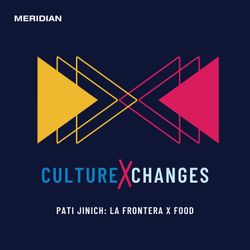
3. Pati Jinich: La Frontera x Food
25:59||Season 3, Ep. 3On this episode of cultureXchanges, Meridian’s CEO Ambassador Stuart Holiday speaks with Mexican Chef, TV host, author, and educator Pati Jinich. Throughout this episode, Pati discusses her experience with food and diplomacy and how these themes work together to transcend histories, borders, and identity. Pati Jinich is the Emmy-nominated Mexican host and executive producer of both La Frontera, her PBS Primetime docuseries that reveals untold stories from the US-Mexico border, and Pati’s Mexican Table, which has brought Mexican flavors into American homes for more than 10 years. A James Beard award-winning chef and former political analyst, Pati has made it her life’s work to build greater understanding between her two home countries: Mexico, where she was born, and the United States, where she currently resides and is raising her family. In addition to her television work, she is a New York Times bestselling author with 3 cookbooks, including her most recent book Treasures of the Mexican Table: Classic Recipes, Local Secrets.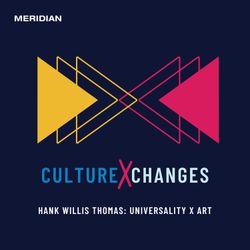
2. Hank Willis Thomas: Universality x Art
26:23||Season 3, Ep. 2Today on cultureXchanges, Meridian’s CEO Ambassador Stuart Holliday speaks with artist Hank Willis Thomas on how growing up in Washington, DC shaped his artistic vision, the theme of universality in his work, and what politicians could learn from the world of art criticism. Thomas lives and works in Brooklyn, New York as a conceptual artist working on themes related to perspective, identity, commodity, media, and popular culture. His work has been exhibited throughout the United States and abroad including the International Center of Photography, Guggenheim Museum Bilbao, Hong Kong Arts Centre, the Witte de With Center for Contemporary Art, and the Rubell Museum here in Washington, DC. His collaborative projects include In Search of the Truth, The Writing on the Wall, and the For Freedoms Collective. He is also a member of the Public Design Commission for the City of New York.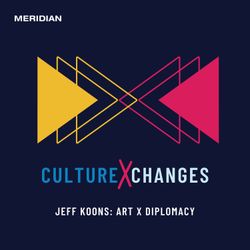
1. Jeff Koons: Art x Diplomacy
30:40||Season 3, Ep. 1On this episode of cultureXchanges, Meridian’s CEO Ambassador Stuart Holliday speaks with artist Jeff Koons to learn about his upbringing and the impact of his work on a global scale. Koons is one of the most well-known working artists today, with his large-scale sculptures and bold paintings touching on ideas of commodity, spectacle, and consumerism. His work belongs to the collections of The Broad, the Hirshhorn Museum and Sculpture Garden, the Los Angeles County Museum of Art, the Museum of Modern Art, the Tate, and the Whitney Museum of American Art. Koons has received numerous awards and honors in recognition of his cultural achievements, including the Officer of the French Legion of Honour; the State Department’s Medal of the Arts for his outstanding commitment to the Art in Embassies Program and international cultural exchange; and the U.S. Consulate General’s Award for Cultural Diplomacy in Florence. His work has been exhibited extensively in New York, London, Chicago, Basel, Florence, Seoul, and elsewhere.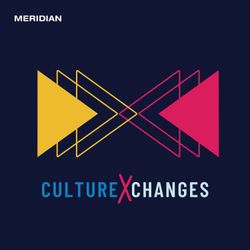
5. Talking Tacos Trucks: Cuisine x Urban Spaces
23:39||Season 2, Ep. 5When taco trucks first arrived in the United States in the 1970s as workers from Mexico migrated to California, the menus combined Mexican food with American tastes. Now, food trucks are used for almost any cuisine imaginable and have revolutionized the way food is sold throughout the United States; however, Mexican food trucks have not always been welcomed by local governments, the public, and the culinary world. Today on cultureXchanges, we are having an engaging conversation with scholar and filmmaker Dr. Robert D. Lemon on the contribution of Mexican food trucks to urban space, public policy, and American cuisine. Any views, findings, conclusions, or recommendations expressed in this web page do not necessarily represent those of the National Endowment for the Humanities.
4. Promoting Preservation: Diplomacy x Heritage
16:56||Season 2, Ep. 4In 2001, the U.S. Department of State launched the Ambassadors Fund for Cultural Preservation (AFCP), a program to help preserve cultural heritage worldwide and to officially incorporate cultural preservation and protection into American diplomacy. AFCP supports international preservation projects that span a wide range of cultural heritage initiatives, including the preservation of historic buildings, archaeological sites, ethnographic objects, paintings, manuscripts, indigenous languages, and other forms of traditional cultural expression. Since 2001, the Fund has supported more than 1,000 projects in over 130 countries with local museums, ministries of culture, nonprofits, and other organizations. Furthermore, AFCP projects provide professional development for American cultural heritage professionals and students from nearly all 50 states. In this episode of cultureXchanges, we are speaking with Dr. Martin Perschler, program director for the Ambassadors Fund for Cultural Preservation at the U.S. Department of State. Any views, findings, conclusions, or recommendations expressed in this web page do not necessarily represent those of the National Endowment for the Humanities.
3. Woven in Wampum: Treaties x Culture
50:14||Season 2, Ep. 3Wampum, small beads made from shells, were at the center of diplomacy in North America in the early 17th century. The exchange of strings and belts adorned with wampum were diplomatic tokens, gifts, and most notably, treaty markers between Indigenous peoples and Europeans. On this episode of cultureXchanges we speak with Darren Bonaparte, cultural historian from the Akwesasne First Nation and current director of the Tribal Historic Preservation Office of the Saint Regis Mohawk Tribe.Any views, findings, conclusions, or recommendations expressed in this web page do not necessarily represent those of the National Endowment for the Humanities.
1. Spirit of the Banjo: Resilience x Tradition
22:00||Season 2, Ep. 1The banjo is an instantly recognizable sound that has become synonymous with American folk music, a genre traditionally associated with White musicians. However, the banjo was originally created by enslaved Africans and their descendants in the Caribbean and North America, widely recognized as an African American tradition with a West African heritage. The banjo heard in American music is a distinct blend of West African and European cultures that widely differs from the West African banjo sound. On this episode of cultureXchanges, we speak with Kristina Gaddy to uncover the history of the banjo and how its sound has developed as a result of cultural exchange. Ms. Gaddy is a Baltimore-based writer and the author of Well of Souls: Uncovering the Banjo's Hidden History. Any views, findings, conclusions, or recommendations expressed in this web page do not necessarily represent those of the National Endowment for the Humanities.
5. Now on Display: Museums x Diplomacy
28:52||Season 1, Ep. 5Museums Connect was a joint initiative between the U.S. Department of State’s Bureau of Educational and Cultural Affairs and the American Alliance of Museums (AAM). This initiative partnered museums in the United States with museums abroad to help foster cross-cultural engagement and exchange. On this episode of cultureXchanges, we speak with Dr. Richard J.W. Harker, author of Museum Diplomacy: Transnational Public History and the U.S. Department of State, about this program and the role it played in connecting transnational public history with international diplomacy. For a full transcript of this episode, please visit https://culture.meridian.org/podcast Any views, findings, conclusions, or recommendations expressed in this web page do not necessarily represent those of the National Endowment for the Humanities.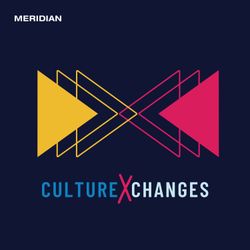
4. Soviet Love Songs: Cliburn x Khrushchev
25:49||Season 1, Ep. 4In 1958, at the age of 23, Texan pianist Van Cliburn won the inaugural International Tchaikovsky Competition in Moscow with his own arrangement of the beloved song “Moscow Nights.” Throughout his career, Cliburn continued to return to the Soviet Union for many televised performances and developed a lasting relationship with Soviet leader Nikita Khrushchev. On this episode of cultureXchange, we speak with Maggie Estes, director of communication and digital content at the Cliburn Foundation on Cliburn’s legacy and how music plays a role in cultural diplomacy. For a full transcript of this episode, please visit https://culture.meridian.org/podcast Any views, findings, conclusions, or recommendations expressed in this web page do not necessarily represent those of the National Endowment for the Humanities.
loading...